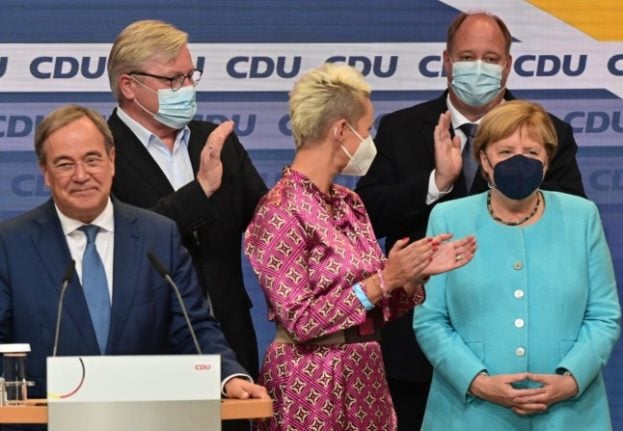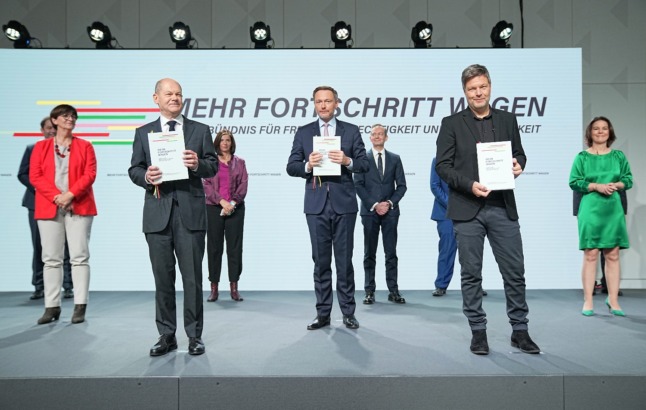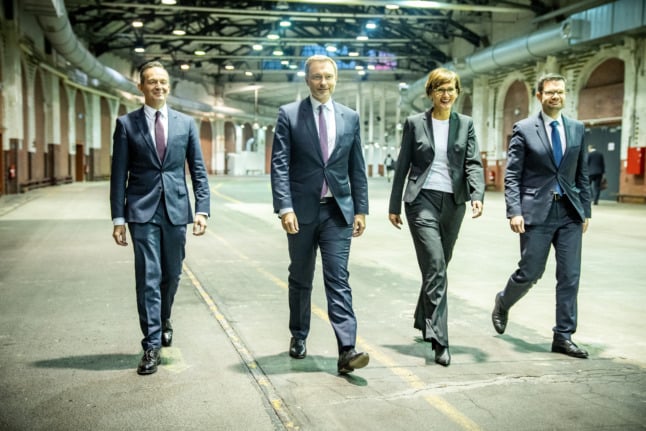The centre-left Social Democrats (SPD) might have hoped to be popping the champagne corks when the voting wrapped up Sunday after opinion polls had shown them likely to emerge the strongest from the general election.
But with first estimates showing a razor-thin margin between the SPD and the outgoing Angela Merkel’s conservative CDU-CSU alliance, the mood was tense at an election night event in Berlin.
“I am disappointed that the SPD is more or less level with the CDU-CSU. But it remains exciting what coalition possibilities will now emerge,” said Oliver Pawloski, 39, a member of the SPD.
The atmosphere before the results had been festive, with party members hoping for a victory for the SPD and its chancellor candidate Olaf Scholz, 63.
But the exit polls provoked some “oohs” of disappointment.
Preliminary results show the SPD on around 25 percent of the vote, with the CDU-CSU and their chancellor candidate Armin Laschet on about 24.5 percent.
“I had hoped for a bit more,” said Susanne Boeltes, 50.
LIVE: Centre-left Social Democrats edge ahead in German election results
ZDF-Hochrechnung zur Bundestagswahl.
(Stand 20:13 Uhr)#btw21 pic.twitter.com/snPlWbg82n— ZDF (@ZDF) September 26, 2021
However, even though the race is closer than the SPD would have liked, the party has still managed a significantly better score than in Germany’s last election four years ago.
The party was a junior partner in three out of four of Merkel governments and in 2017 scored just 20.5 percent of the vote.
“After 16 years, social democracy could be the strongest force in Germany again, and that is a reason to celebrate,” said Sebastian Niestroj, 26.
‘It hurts a lot’
At the CDU’s headquarters in Berlin, the stage was also set for rousing victory speeches amid hopes that Laschet, famous for his last-minute comebacks, still had another one in him.
But when the exit polls came through, there was a stunned silence followed by a few bursts of clapping.
“The result is very bad for the CDU, unacceptable,” said Gereon Stieler, 26. “The CDU’s ambition is always to field the chancellor.”
If the estimates are confirmed, Sunday’s result would be the worst in the CDU-CSU’s post-war history.
READ ALSO: Polls show election still too close to call
The party has dominated politics in Germany for much of the past 70 years and has never scored under 30 percent in a general election, but had struggled to rebrand itself after 16 years of Merkel as chancellor.
“It hurts a lot that Merkel is no longer there,” said Alfons Thesing, 84.
“Laschet couldn’t make up for her,” he said, though he did also say he thought Laschet was “the best candidate”.
Merkel had in the closing weeks of the campaign done her best to shore up the 60-year-old Rhinelander, appearing alongside him at campaign events.
But for Daniel Gerjets, 34, “Merkel should have joined earlier. Maybe she should have had a shorter summer break and come earlier in the campaign,” he said.
By Florian CAZERES and David COURBET




 Please whitelist us to continue reading.
Please whitelist us to continue reading.
Member comments